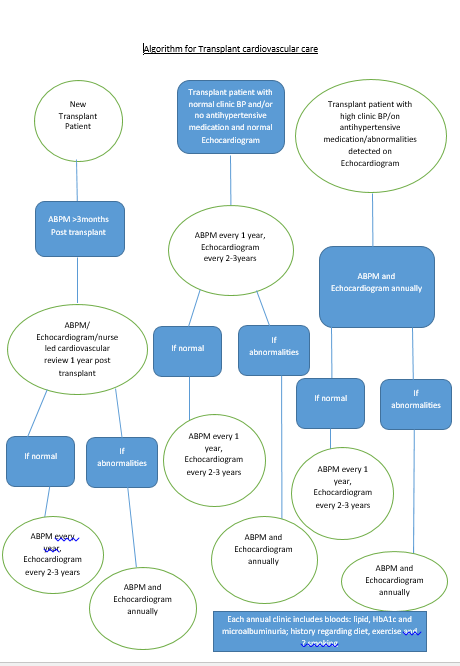Post Kidney Transplant cardiovascular service – proactive screening in paediatric recipients
Louise Kipping1, Alex Savis1, Grainne Walsh1, Helen Jones1, Nick Ware1, Joanna Newton1, Manish Sinha1.
1Evelina London Children’s Hospital, Guy's & St Thomas's Hospitals NHS Foundation Trust, London, United Kingdom
Introduction: Post-transplant recipients often have a degree of chronic kidney disease (CKD) 30-40% of children with CKD have elevated blood pressure. Links between childhood hypertension and organ damage are well established. Adequate control of blood pressure is essential in optimising graft survival in renal transplant recipients (Flynn at al, 2004).
We set up a post-transplant cardiovascular service with the aim of improving the diagnosis and management of hypertension in children following kidney transplantation, to identify patients with masked hypertension and echocardiographic changes. Previously this was a reactive process often limited to children with elevated office BP only.
Methods: National and international guidelines for managing blood pressure in children recommend performing 24-hour Ambulatory Blood Pressure Monitoring (ABPM) annually in kidney transplant recipients. ABPM is considered the gold standard and a tool to optimise cardiovascular outcomes.
The transplant cardiovascular clinic takes place monthly. We also perform ad hoc ABPMs as clinically indicated. Our initial objective was to perform paired ABPM and echocardiogram studies in all kidney transplant recipients. Subsequently we developed a clinical algorithm (shown below) to guide further patient management.
The clinic review consists of a systematic measurement of blood pressure using the hypertension guidelines standardised protocol of 3 consecutives measurements on the right arm using stethoscope, sphygmomanometer and appropriate cuff. We screen for blood abnormalities linked to cardiovascular health including lipid profile, HbA1c and urine albumin:creatinine ratio.
We also explore lifestyle factors (including diet and exercise) associated with cardiovascular health as well as provide education. We believe it is important to monitor our patients’ body mass index (BMI) given increased BMI has strong links to poor cardiovascular outcomes. Patients have an echocardiogram and if >120cm tall an ABPM.
Results: Between September 2018 and April 2022 we performed 174 ABPMs on 111 Males and 63 Females. And 120 number of patients had an echocardiogram. The mean estimated glomerular filtration rate for our patients is 55ml/min/1.73m2, with 26.5 % below 45ml/min/1.73m2.
Conclusion: By establishing this proactive screening pathway we have improved the overall management of blood pressure and cardiovascular health of kidney transplant patients. This dedicated service has also helped develop nursing and medical expertise in this relatively under-researched area but also highlighted to children and their families the importance of good cardiovascular health.

References:
[1] J.T. Flynn et al, (2004) Clinical Practice Guidelines for screening and management of high blood pressure in children and adolescents. The American Journal of Pediatrics.
[2] J.T. Flynn et al Blood pressure in children with chronic kidney disease: a report from the Chronic Kidney Disease in Children study. (2008) Hypertension. Vol 52 (4)
Lectures by Louise Kipping
| When | Session | Talk Title | Room |
|---|---|---|---|
|
Sat-25 18:00 - 19:15 |
P6- Kidney Posters | Post Kidney Transplant cardiovascular proactive screening- does it make a difference? | Zilker 1-2 |
|
Sat-25 18:00 - 19:15 |
P6- Kidney Posters | Post Kidney Transplant cardiovascular service – proactive screening in paediatric recipients | Zilker 1-2 |
